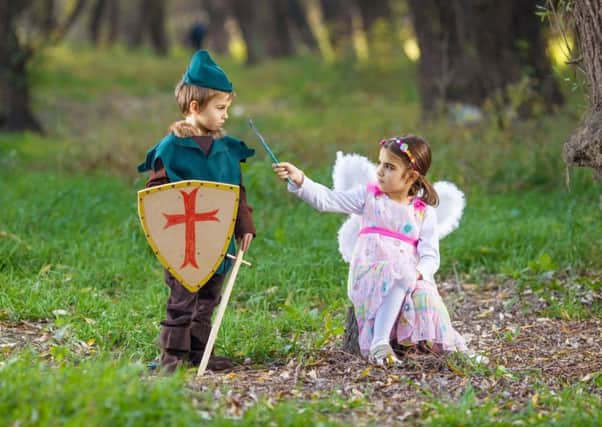James Millar and Ros Ball: How to rear heroes and heroines


We can’t take any credit for the timing, that’s down to a combination of some sort of magic foresight on the part of our publisher and the fact that gender issues are always with us.
The Doctor Who stooshie neatly sums up the lack of female role models in popular culture, and the resistance to changing that. If there were already enough iconic female characters to go round, the casting of Jodie Whittaker wouldn’t have raised an eyebrow.
Advertisement
Hide AdAdvertisement
Hide AdThe second story, the ASA report, came with cast iron evidence that gender stereotypes harm kids and made the point that while one advert on its own might have little impact, there’s a cumulative effect and the weight of expert opinion is that over time it does matter.
For The Gender Agenda, we spent two years documenting all the little ways that our daughter and son were treated differently, and while each incident could be dismissed as inconsequential, if you put them together you got a bigger, more compelling and, we’d argue, darker picture. From birth, children are constricted and limited by the stereotypes applied by society, by popular culture and by their parents and family.
When our son was born nearly three years after our daughter we knew something was going on in the way he was treated by comparison with her. For example, she was given a white fluffy teddy bear in a pink hat when she was born; he got a T-Rex baring its teeth. Boys are trained to like aggression straight out of the womb.
When we took our son to be weighed the district nurses praised him as a “lovely big boy”. No-one ever commented on our daughter being big like it was a good thing. Even though she was way chubbier than he ever was. Big girls are bad girls in our society.
And while our daughter’s first three years seemed to be all action, the most attention she ever received was the day she was a bridesmaid and everyone commented on how lovely she looked. In the months after, she’d often ask to put on her bridesmaid’s dress again because “people liked her” when she wore it.
So when we stumbled across an old book on eBay called There’s A Good Girl, it changed everything. It was written by a German lawyer called Marianne Grabrucker in 1981. She noted down all the ways her daughter was treated differently in her first three years. How saying “there’s a good girl” was a way of encouraging demure behaviour among females while a male child acting up was dismissed with the age-old excuse “boys will be boys”.
Her approach made sense. When you’ve got a problem at work, for example, the advice is to keep a diary, build up a body of evidence of every time the problem arises.
We recorded instances of our kids being treated differently on Twitter using the @GenderDiary handle. This made it more immediate and it meant we tapped into a community of like-minded people, folk who let us know we weren’t alone and that we were on to something.
Advertisement
Hide AdAdvertisement
Hide AdAnd through them we began to pull together resources and strategies to fight back.
When we complained that in so many children’s books all the characters are male, our followers suggested we pull together some alternatives. So we crowd-sourced a list of books that feature lead female characters like queens from history and princesses that fight dragons (a firm favourite remains The Paper Bag Princess, who dismisses the knight who seeks to “save” her by telling him he’s a “bum”).
We also pledged that trips to the cinema would alternate between seeing films with a male lead and ones with a female lead. Initially that meant seeing a lot of Tinker Bell films, but things have improved – Frozen broke the mould and Wonder Woman has just broken box office records.
We found that gender is largely a man-made construct, pun intended.
And why does any of it matter? Because we limit our children when we label them. No parent would knowingly sign up to put barriers in the way of their children’s ambition or outlook.
We hope that The Gender Agenda makes these barriers easier to see, easier to avoid and makes all children’s lives easier and more equal.
The Gender Agenda, James Millar and Ros Ball, Jessica Kingsley Publishers, £9.99